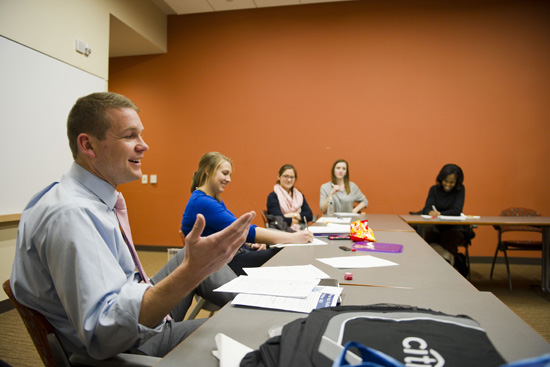Life after BU
Classes prepare students for the inevitable: adulthood

Brian Troy, a branch manager at Citibank, talked about financial management at a recent Life after BU class, organized by Mandy Patrick (SAR’11,’13) (second from left). Photo by Kalman Zabarsky
While grad student Mandy Patrick credits her parents with teaching her life skills such as time management and financial management, cooking was not on their agenda.
Patrick (SAR’11,’13) recalls the first Thanksgiving dinner she hosted for friends, when she opted to make a squash cranberry dish she found on a popular cooking website. “It was simple, maybe one star of difficulty,” she says. “I totally bombed it. I burned it; I couldn’t figure out how to peel the squash. It was a nightmare.”
Aware that fellow students were struggling with similar conundrums, Patrick decided to help them out with a free seven-week intensive course designed to teach life skills to help in the transition to adult life. The course, Life after BU: Living Life to Its Fullest, concludes tonight.
Patrick created the class as part of an independent study under the supervision of occupational therapist Karen Jacobs (SAR’79), a Sargent College of Health & Rehabilitation Sciences clinical professor. The program is run in conjunction with the Office of Residence Life and is held at StuVi II.
“This class is so important because it tries to teach skills that are overlooked, but that students need,” Jacobs says. “The world is complex, and there are lots of challenges, so we hope this course serves as a booster shot so that students can leave here with confidence in different areas.”
The one-hour classes have explored money management, stress relief, sleeping tips, and cooking. Patrick sometimes leads an informal discussion and subsequent activities, and she also brings in experts for the classes on financial management and the job search. The classes are intensive and usually attract 10 to 15 students per class.
One recent Tuesday night, a handful of young women gather in a StuVi II classroom for a crash course in financial management. The evening’s guest speaker is Brian Troy, a branch manager at Citibank, who starts off with some big questions.
“Figure out what’s important to you first,” he says. “Is it important to be secure? Happy in regard to your quality of life? It’s a little tricky where you are right now in life, and figuring out your priorities.”
From there he launches into a crash course on things ranging from ATM fees (avoid them at all costs) to setting up a practical budget that you can stick to.
“It’s OK to buy a cup of Starbucks every day if you budget for it,” he tells the class. “But if you don’t have a budget for the month based on what you make and bills you must pay, you’re setting yourself up for failure.”
He urges students to sign up for their employer’s matching 401K, to stay on their parents’ health insurance until they are 26, and to pay off two bills a month with a credit card to build a credit score, which can one day help them buy a car or a house.
“Tonight was useful because financial management is one of my biggest concerns after graduation,” says Jenny Pianucci (SAR’13), who appreciated tips on credit card debt. “In college your parents back you up, but it’s a big step to be on your own. Leaving the BU bubble is intimidating, but I found this class eases the transition and braces me a bit.”
As this year’s class comes to an end, Jacobs says, she will encourage another student to take it on next year as an independent study. Patrick promises to make her materials available to the Office of Residence Life.
“I’m very proud of Mandy for setting this all up,” says Jacobs. “She took the initiative to plan this whole thing, and she’ll make a fantastic occupational therapist one day. I hope she continues this program wherever she goes next.”
After all, one day everyone must leave the world of BU dorms and late night Easy Mac, and join the world of 40-hour workweeks. Fortunately, Easy Mac can stay.
Life after BU will be taught tonight, March 20, at 8 p.m. in StuVi II Room 101. The class will focus on the job hunt, with individual résumé critiques and mock interviews. Students should bring their résumés. More information can be found here.
Looking for more life tips? Check out BU’s Financial Assistance Office Smart Money 101 initiative, which offers workshops and seminars, and the Center for Career Development’s website.

Comments & Discussion
Boston University moderates comments to facilitate an informed, substantive, civil conversation. Abusive, profane, self-promotional, misleading, incoherent or off-topic comments will be rejected. Moderators are staffed during regular business hours (EST) and can only accept comments written in English. Statistics or facts must include a citation or a link to the citation.